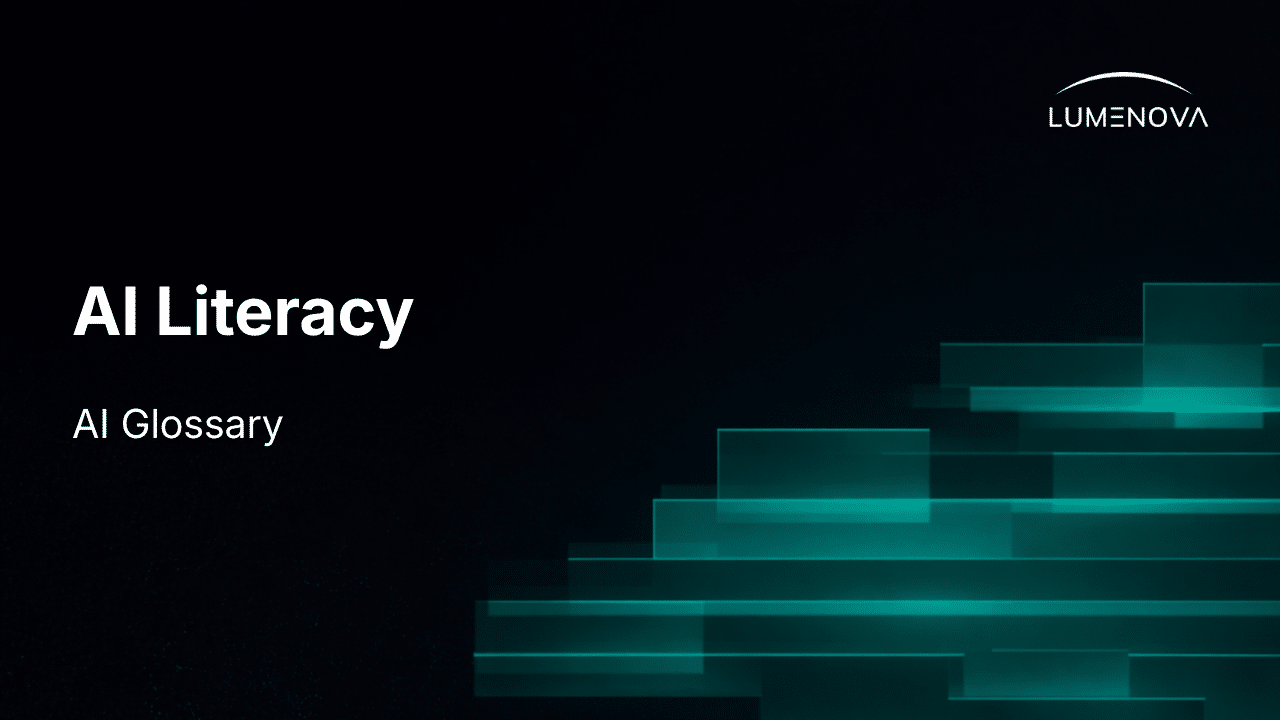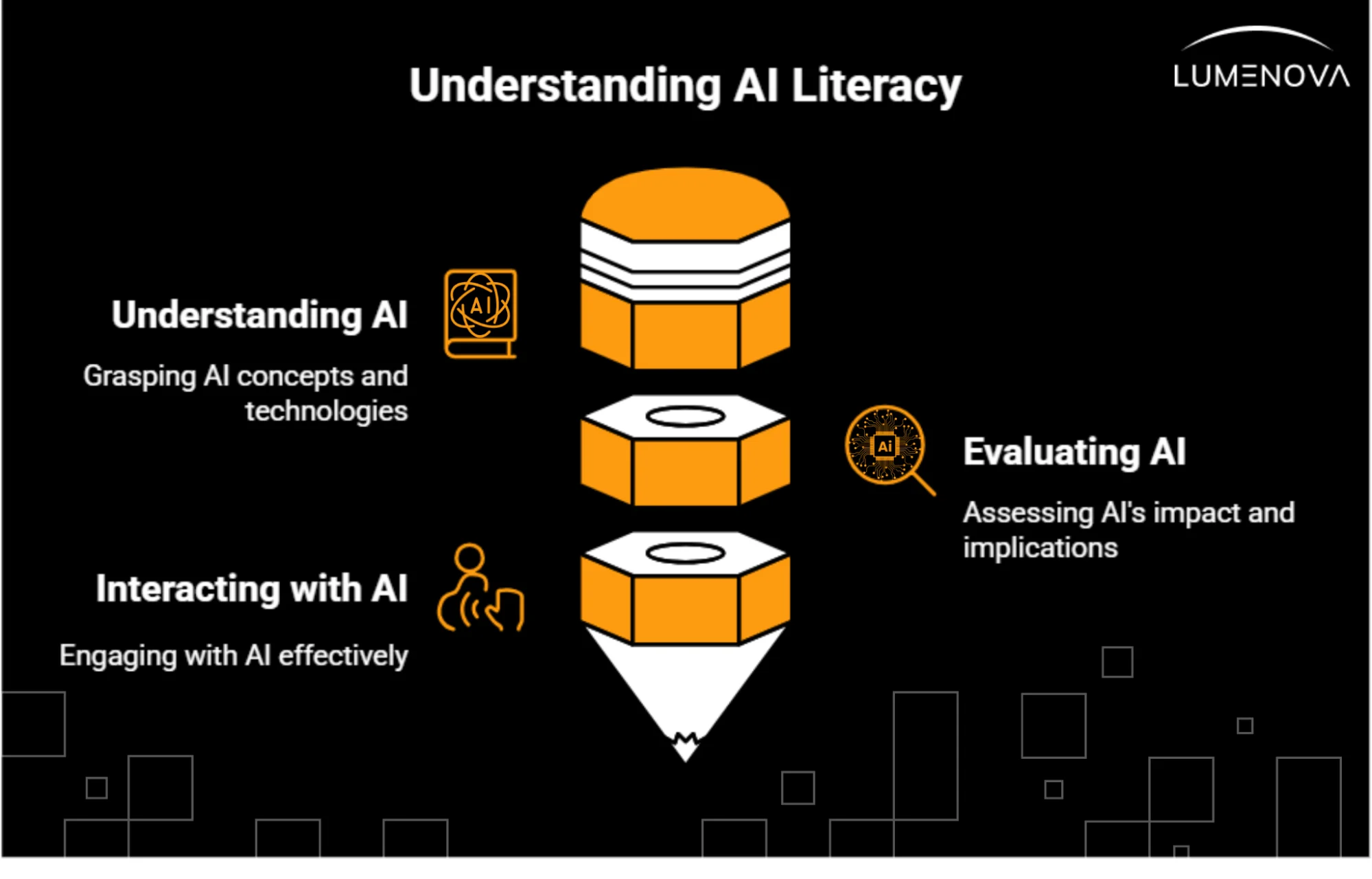AI Literacy

What is AI Literacy?
AI literacy refers to the ability to understand, evaluate, and interact with AI in a meaningful, safe, and effective way. As AI continues to reshape industries, education, and daily life, developing this knowledge is essential for individuals and organizations to make informed decisions and use AI responsibly.

Importance
With AI integrated into everything from search engines to healthcare systems, AI literacy ensures people can critically engage with and benefit from AI-powered technologies. Its importance extends to all sectors, including education, finance, healthcare, and media, helping individuals distinguish between reliable and misleading AI-generated content. AI and information literacy are also critical for combating misinformation and understanding AI biases.
In Education
A growing (but still limited) number of schools and universities are starting to weave dedicated modules into their curricula, moving from policy pledges to pilot programs. Programs for students and for teachers focus on developing foundational knowledge about AI systems, their capabilities, and their ethical implications. Many universities are introducing dedicated courses and integrating AI into digital literacy to enhance critical thinking and data analysis skills.
In the Workplace
Workplace AI adoption requires employees to develop critical literacy to navigate AI-enhanced tools effectively. Studies on explaining AI to employees of digitally-powered workplaces emphasize the need for tailored AI training programs. Businesses are investing in training and assessment initiatives to equip employees with the knowledge to use AI responsibly and productively.
In the Media
Understanding AI’s role in content generation is crucial for media professionals and consumers alike. AI and media literacy programs focus on detecting AI-generated misinformation, evaluating AI-driven journalism, and understanding how AI impacts public discourse. Such initiatives are crucial in order to help individuals navigate AI’s influence on news, social media, and advertising.
In Other Sectors
- AI and Financial Literacy: Understanding AI-driven financial systems, fraud detection, and automated trading.
- AI and Health Literacy: Educating healthcare professionals on AI applications in diagnostics, treatment planning, and patient data management.
- Generative AI: Teaching individuals and businesses how generative AI tools work and how to use them responsibly.
Frameworks and Standards
To ensure effective AI education, various organizations have developed dedicated frameworks, including the UNESCO AI Literacy Framework and the Digital Promise Framework. These frameworks outline key competencies such as:
- Understanding AI fundamentals.
- Evaluating AI-generated content.
- Ethical considerations in AI development and deployment.
- Hands-on experience with AI tools and applications.
EU AI Act
The EU AI Act requirements highlight the need for widespread education on AI governance, ethics, and compliance. Organizations must train employees to understand AI risks, data privacy concerns, and algorithmic transparency. AI education is becoming a priority as governments push for increased public awareness about AI systems.
AI and Data Literacy
AI literacy will likely evolve hand-in-hand with data literacy; as organizations roll out AI-powered data-literacy programs, these skills should help people interpret AI outputs responsibly and spot bias in future data-driven decisions.
Programs and Courses
Governments, universities, and tech companies are launching dedicated programs to promote AI education. Some notable initiatives include:
- National AI Literacy Day, an effort to raise awareness worldwide.
- Courses to educate people on AI basics and advanced concepts.
- AI literacy fundamentals, which help individuals join the AI conversation with confidence.
Considerations for the Future
As AI continues to evolve, education will play a fundamental role in equipping individuals with the skills needed to engage with AI effectively and responsibly. Organizations must invest in AI literacy curricula, training programs, and awareness campaigns to ensure widespread AI competence. Whether through formal education or workplace training, fostering AI literacy will empower individuals to leverage AI responsibly and make informed choices in an increasingly AI-driven world.
Frequently Asked Questions
AI Literacy is the ability to understand, critically evaluate, and effectively engage with AI technologies. It is crucial for organizations as it enables informed decision-making about AI implementation, helps identify potential risks and ethical concerns, and ensures that AI is used responsibly to drive innovation and competitive advantage.
Because no widely accepted AI-literacy assessment yet exists, companies usually create their own rubric, or adapt early research benchmarks and update it as the field matures.
Key components include understanding AI fundamentals, recognizing AI capabilities and limitations, evaluating AI-generated content, considering the ethical implications of AI use, and staying informed about AI governance and compliance issues, such as those outlined in the EU AI Act.
AI Literacy and data literacy are closely linked, as AI systems rely heavily on data. While data literacy focuses on understanding and interpreting data, AI Literacy extends to comprehending how AI processes and learns from that data. Both are essential for making informed decisions, ensuring ethical AI applications, and reducing biases in AI-driven processes.
Without prioritizing AI Literacy, organizations risk making uninformed decisions about AI implementation, potentially leading to ineffective use of AI technologies, ethical missteps, compliance issues, and missed opportunities for innovation. A lack of AI Literacy could also result in a competitive disadvantage as AI becomes increasingly integral to business operations across industries.
Yes, AI Literacy considerations vary by industry. In finance, understanding AI-driven financial systems and fraud detection is critical. In healthcare, AI Literacy focuses on AI applications in diagnostics and patient data management. Industry-specific AI literacy resources can provide more targeted information tailored to specific sectors.
Integrating AI Literacy into a long-term business strategy involves investing in ongoing AI education for employees, establishing AI governance frameworks, staying updated on AI regulations, and fostering a culture of responsible AI use. Partnering with AI literacy experts or institutions can help develop a comprehensive, forward-looking AI Literacy program tailored to an organization’s needs and goals.